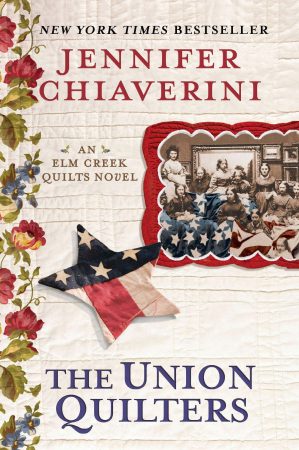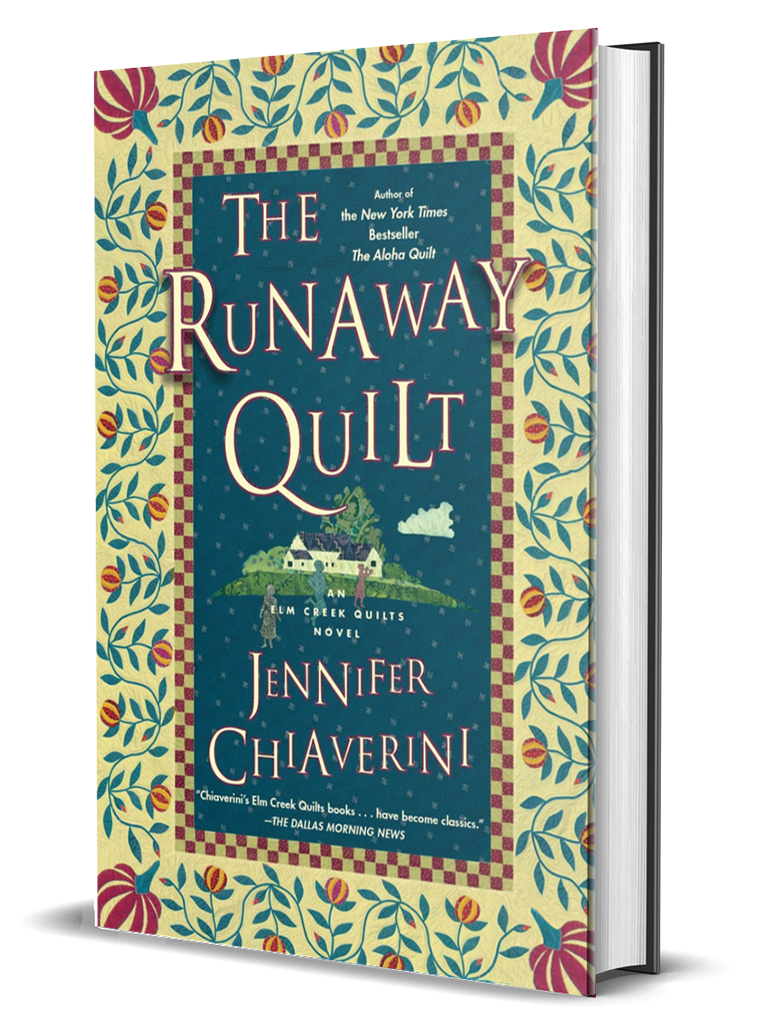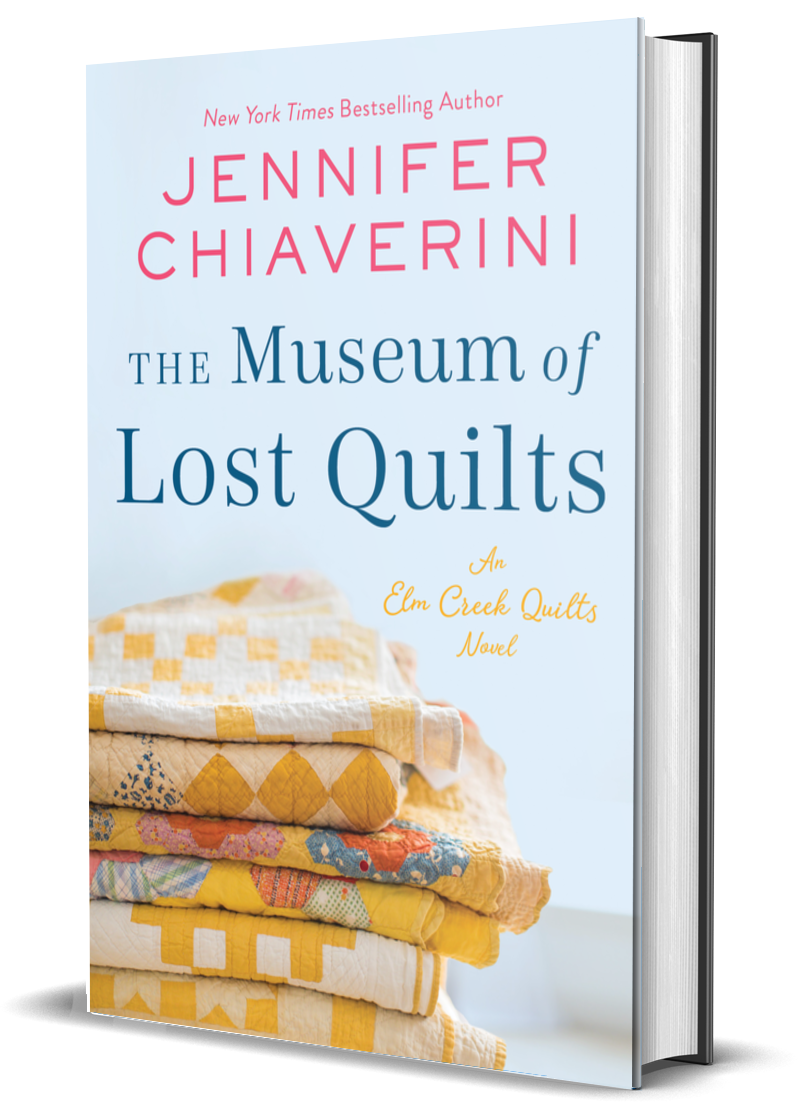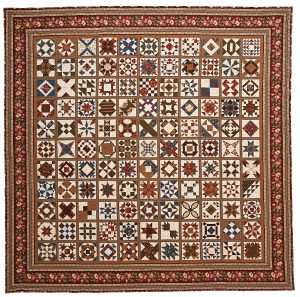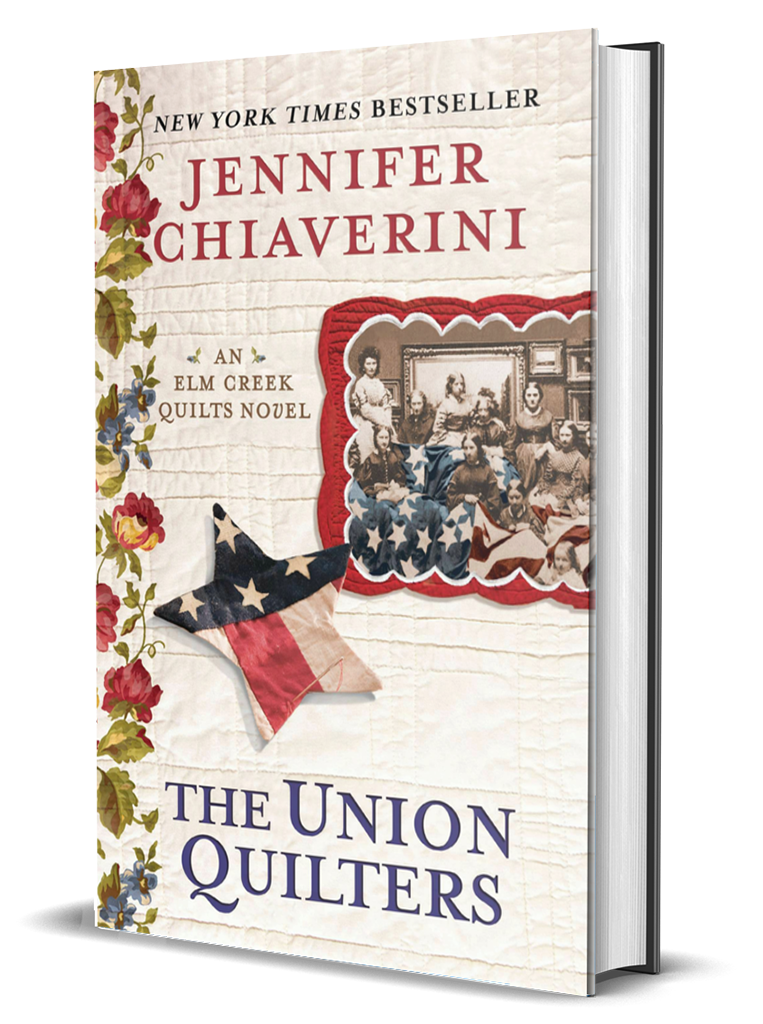
The Union Quilters
The New York Times bestselling author of the Elm Creek Quilts series joins the Dutton list with a Civil War-era tale of love and sacrifice behind Union lines. With the The Union Quilters, Chiaverini delivers a powerful story of a remarkable group of women coping with changing roles and the extraordinary experiences of the Civil War.
“If all that has been said by orators and poets since the creation of the world in praise of woman were applied to the women of America, it would not do them justice for their conduct during this war.” — Abraham Lincoln
In 1862, the men of Water’s Ford, Pennsylvania, rally to answer Mr. Lincoln’s call to arms, spurring the women of the Elm Creek Valley into their own battle to preserve the nation. Dorothea Granger, dismayed by her scholarly husband’s bleak descriptions of food shortages and illness in the soldiers’ camps, marshals her friends to “wield their needles for the Union” and provide for the men’s needs. Her friend Constance Wright staunchly supports her husband as he is repeatedly turned away from serving in the Union army because of the color of his skin, determined to help him secure both the privileges and the responsibilities of citizenship. Anneke Bergstrom’s pacifist husband does not enlist, but his safety becomes her shame—one that compels her to work ceaselessly for the Union cause to prove her family’s loyalty. A gifted writer committed to hastening the end of the war, Gerda Bergstrom takes on local southern sympathizers in the pages of the Water’s Ford Register, risking the wrath of the Copperhead press—and the jealous wife of the regimental surgeon she loves.
While the women work, hope, and pray at home, the men they love confront loneliness, boredom, and harrowing danger on the bloody battlefields of Virginia and Pennsylvania. Anxious for news, the women share precious letters around the quilting circle, drawing strength and comfort from one another as they witness from afar the suffering and deprivation their husband, brothers, sons, and sweethearts must endure. It falls to the Union Quilters to provide for the soldiers at the front and the wounded veterans who have come home, to run farms and businesses, and to protect their homes and families when the Confederate army threatens the Elm Creek Valley. Their new independence will forever alter the patchwork of town life in ways that transcend even the ultimate sacrifices of war.
Praise for The Union Quilters
Read an Excerpt from The Union Quilters
1861
Dorothea tied up the sack of salt pork and hard bread–enough for a week if Thomas didn’t find some poor soul in greater need to share with–and pressed the back of her hand to her forehead, taking a deep breath, fighting to still the whirl of thoughts. She knew she had forgotten something, something essential, something her husband would suffer without on the long marches through hostile lands, on the cold, lonely nights away from home. If she remembered what it was after he left the Elm Creek Valley, after he crossed the pass through Dutch Mountain with the other brave and patriotic men who had decided to answer Mr. Lincoln’s call to arms, it would do him no good whatsoever. Though he was the love of her life and her most cherished friend, she could not follow him into war.
From behind her came the sound of a muffled sob, and Mrs. Hennessey emerged from the pantry, wiping her eyes with the corner of her apron. At the sight of the housekeeper’s tears, Dorothea pressed her lips together and inhaled sharply, briskly tightening the knot on the sack of provisions. She would not weep; she must not weep. Thomas had asked her for only that as he held her after they had made love the night before, that she not mourn him until he was truly gone. “I have every intention of returning to you,” he had said, kissing her cheeks, her lips, her forehead, brushing her long brown locks gently off her face. “You must believe it too. Your hopes will sustain us both.” In the semidarkness she had nodded, not trusting herself to speak. Thomas was not a superstitious man; he knew very well that men died in war, and the prayerful wishes of a devoted wife would offer him no protection from a Rebel minie ball. But neither would worry, and with baby Abigail to care for and many friends and neighbors looking to her in their worry and distress, she must choose confidence, hope, and determination. She could not, on the eve of his departure, distract Thomas with worries that she could not manage without him.
Mrs. Hennessey did not need to disguise her true feelings. “A man like Mr. Nelson’s got no business marching off to war,” she said, her ruddy cheeks flushed with indignation, frenzied strands of curly gray-streaked auburn hair escaping the bun at the nape of her neck. A longtime employee of Thomas’s parents, she had cared for Thomas since he was a boy in Philadelphia and had accompanied him when he came to Water’s Ford to take over Two Bears Farm and run the town primary school twelve years before. “A man like him ought to be in Washington City running things, not risking his life scrapping with the rabble. Don’t he have a farm to look after, and his book to write, and a family that needs his protection?”
“All the other soldiers have families and livelihoods too,” Dorothea pointed out, as she had the first dozen times the proud and protective housekeeper had expressed that opinion. “They can’t all stay home. Nor could Mr. Nelson both advise the president on matters of state and look after things around here.”
Mrs. Hennessey dismissed that with a wave of her hand, as if to say a smart man like Thomas Nelson could figure a way around the impossibility of being in two places at once. “All I know is you don’t want him to go any more than I do, and he wouldn’t, if only you’d tell him about your condition.”
Dorothea nearly dropped the bundle of food she had packed so carefully. “How did you–” But of course. Every Tuesday Mrs. Hennessey did the washing. She would know that Dorothea’ was late. “You must not tell him. Promise me. It’s much too early.”
“Of course I won’t breathe a word. It’s not my place.” Mrs. Hennessy gave her apron a vigorous tug, then hesitated, brushing off imaginary crumbs. “But if telling him would change his mind–”
“He might go anyway.” Thomas believed the Union cause was just and noble, and he was not a man to sit safely at home while other men risked their lives for principles he held sacred. “Would you have him go into battle worried and distracted?”
“I wouldn’t have him go at all, and neither would you.” Mrs. Hennessey regarded her sharply, her blue eyes red and puffy from tears. “You and your parents, and all them folk from Drowned Farm–”
“Thrift Farm,” Dorothea amended mildly, out of habit. As a child she had lived with her parents and brother in a community of Transcendentalist Christians who had been enlightened ethicists and philosophers but poor farmers. Though the farm had been lost to a flood years before, obliging Dorothea’s family to move in with her cantankerous Uncle Jacob, even newcomers to the Elm Creek Valley like Mrs. Hennessey considered it a fine subject for jokes.
“Pacifists, each and every one of you,” Mrs. Hennessey declared. “Pacifists and abolitionists. You might as well be Quakers.”
“Might as well,” Dorothea agreed, setting the bundle of food beside the rest of the gear Thomas had left near the front door, wishing she could remember what she had forgotten to pack for his long and dangerous journey away from Two Bears Farm.
She found her husband in Abigail’s room, standing silently beside her crib, stroking her soft, downy hair with a touch as light as a feather. She watched him from the doorway, his slim, wiry frame as familiar to her as her own limbs, his sandy hair boyishly thick, his beard neatly trimmed, bearing only a few threads of gray. His round spectacles caught a narrow shaft of sunlight that slipped between the drawn curtains. Blinking back tears, Dorothea came up behind him, wrapped her arms around his waist, and pressed her cheek to his back between his shoulder blades
“I’m tempted to wake her,” he murmured, clasping Dorothea’s arms with one hand, resting the other upon Abigail’s head, as pretty and fine as a porcelain doll’s. “To say a proper goodbye, to hear her laugh one last time–”
“It won’t be the last time you hear her laugh.”
“I know, but my little baby will be gone by the time I return. She’ll be walking, talking, a proper little girl rather than a babe in arms.”
Dorothea almost blurted out her precious secret, but she had lost a baby early once before, and she was thirty-one, rather mature to be carrying only her second child. She could not stuff one last heavy burden of worry into his pack just before he set out. “The sooner you win this war for Mr. Lincoln,” she said instead, “the younger she’ll be when you come home.”
“I’ll get right to it, then.”
Dorothea tightened her embrace. “There’s no hurry.”
He laughed softly, amused by her quick contradiction. “We can’t miss the festivities. You and your friends worked too hard to make sure we had a rousing send-off.”
“It was mostly Gerda’s doing,” said Dorothea. “Anneke too.” Anneke Bergstrom was one of Dorothea’s few friends with cause to celebrate that morning. Her husband, Hans, had no plans to enlist, and since he had never become a naturalized citizen after immigrating to the United States from Germany, he could not be drafted if the state failed to meet its recruitment quotas with volunteers. Gerda Bergstrom’s emotions, however, were surely conflicted. Though she was likely relieved that her brother Hans would be safe, she was thoroughly and irrevocably in love with Dorothea’s brother, Jonathan, who intended to enlist as a regimental surgeon. The grand farewell in front of the courthouse in Water’s Ford was intended to rally the men’s spirits before they set off for Harrisburg to enlist, but perhaps it would also serve to stoke the women’s courage. Preparations for the men’s departure had occupied their time and thoughts for two weeks, but after the last notes of fife and drum faded and the banners and bunting were taken down and put away, many long, lonely, empty days would stretch ahead of those left behind.
“My modest beloved,” said Thomas dryly, turning to embrace her. “Always giving the credit to others.”
“The rally was Gerda’s idea.”
“Yes, but you organized the ladies of the town, assigned tasks according to their abilities, kept everyone on schedule, and negotiated more than one truce between squabbling parties. I think Mrs. Hennessy perhaps chose the wrong Nelson to send to Washington City.”
Dorothea smiled, wistfully, at the often-discussed suggestion, wishing once again that Thomas could go to Washington rather than to war. “I organized the ladies of my sewing circle,” she acknowledged. “They organized their own neighbors and sisters and friends. I didn’t do everything on my own.”
“The ladies of this town would accomplish little outside their own homes without you to lead them.” Thomas laced his fingers through hers and kissed the back of her hand. She loved his hands, their strength and tenderness, the farmer’s calloused palms and the scholar’s ink-stained fingertips. “You have a gift, my dear. Use it well. With their men gone, many of your friends will be at loose ends. You could encourage them, help them to be industrious–”
“Yes, I certainly will,” she choked out, fighting back tears, forcing a smile. “I’ll be as stern a taskmistress as I was once a teacher. I won’t allow any of my friends a single idle moment to waste in worry. When you men return, you’ll see how well we women managed in your absence, free at last of the yoke of male dominion.”
His eyebrows rose. “You make me afraid to leave you.”
“You may not recognize our town when you return, so marvelously will we transform it in your absence into a feminine utopia. When the war is over and you tally our accomplishments, you will no longer deny us the vote.”
“You know very well that I could deny you nothing.”
Then don’t go, she almost asked, but she knew her arguments would not persuade him now where they had failed before. Though he considered himself a humanist, he did not share her philosophy of non-violence. He was willing to fight and sacrifice his own life if necessary to defend those he loved and to protect the noble principles he held most dear. Dorothea was prepared to give her own life on those same grounds, but she would not take another’s life, and that was where their opinions diverged. What she dreaded most of all was that Thomas would not survive the war, but after that, what she feared most was that he would return to her entirely changed by the violence he had seen–seen, and inflicted.
Sighing, Thomas bent to kiss Abigail’s cheek and led Dorothea from the bedroom, leaving the door ajar. Mrs. Hennessey met them at the foot of the stairs, red-eyed, and gave Thomas a fierce hug. “I’ll say the rosary for you every night,” she vowed. “God bless and keep you safe from harm.” He thanked her quietly and asked her to take care of his family while he was away. She pressed her lips together and nodded before fleeing for the kitchen.
With a heavy heart, Dorothea helped Thomas gather his pack and provisions. She followed him to the barn, and as he hitched up the horses, she suddenly remembered. How could she have forgotten something so treasured, so essential to his comfort?
“I’ll be right back,” she gasped, hurrying back to the house. She startled Mrs. Hennessey, who sat at the kitchen table with her head in her hands, weeping openly, and raced upstairs, her heeled boots clattering on the wooden staircase. At the foot of their bed she threw open the lid to the steamer trunk Uncle Jacob had bequeathed her and withdrew a quilt she had packed away for the summer. She draped it over the bed, sparing only a glance for the painstakingly arranged triangles and squares of Turkey red and Prussian blue and sun-bleached muslin, some scraps carefully saved from her household sewing, others shared by a dressmaker friend and others among her sewing circle. She folded the quilt in half lengthwise, quickly rolled it up into a tight bundle, and tied it off with a wide length of ribbon she had been saving for a hatband. When she returned outside, Thomas had the horses ready and waiting. He watched, silent and perplexed, as she placed the quilt into the back of the wagon with his pack and provisions.
“It’s the Dove in the Window,” she said, climbing onto the seat beside him as he gathered the reins. “I know it’s your favorite.”
“It’s yours as well. I shouldn’t take it.”
“It’s hardly my favorite. I prefer our wedding quilt and the Delectable Mountains I made for my uncle. But even if it were, I would rather you had it.”
He shook his head. “It’s too fine to take on the road. It could be soiled or torn or lost. Likely the army will issue us sturdy blankets with our uniforms.”
“And if they don’t, or if those blankets are delayed?” Dorothea countered. “You’ll be grateful for this quilt when winter comes, even if you can’t appreciate it now.”
“I do appreciate it, all the more so because I recall how hard you worked on it. Think of the conditions we’ll face–”
“I am thinking of the conditions you’ll face.” She felt wretched, helpless, but she fought to keep her voice even. “Take the quilt. It’s not much to carry, and it’ll comfort me to know that it’s keeping you warm when I can’t.”
He fell silent, his eyes searching her face. “Very well.” He chirruped to the horses. “You’re right. If I don’t take it, I’ll regret it later.”
Unwilling to trust herself to speak, she nodded and pressed herself against him on the wagon seat, heartsick, resting her head on his shoulder, imagining she could feel the warmth of his skin upon hers, his arms around her. She longed to lay her head on his chest, pull the quilt over them both, and sleep, sleep until the war passed over them like a thundercloud, holding the worst of its torrent until it cleared the mountains.


